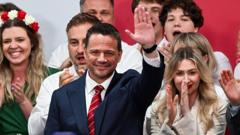Warsaw's liberal Mayor Rafal Trzaskowski has declared an early victory in Poland's presidential election amid a highly competitive race where exit polls suggest a dramatic and closely contested outcome. The preliminary exit poll indicates Trzaskowski capturing 50.3% of the vote, slightly ahead of conservative historian Karol Nawrocki at 49.7%, but these figures fall within the margin of error, leaving the final result uncertain.
Trzaskowski, addressing a jubilant crowd of supporters in Warsaw, proclaimed, “We won,” while humorously remarking that the term "razor's edge" will forever resonate in Poland’s political discourse. He emphasized his commitment to represent all citizens, vowing to be a president for every Polish man and woman. His wife, Malgorzata, added a light-hearted moment by expressing her near panic over the nail-biting electoral count.
On the opposing side, Nawrocki urged his supporters to remain hopeful, declaring the outcome too close to firmly determine a winner. He asserted, “Let’s not lose hope for this night… I believe that we will wake up tomorrow with President Karol Nawrocki,” illustrating the charged atmosphere surrounding the election.
While the presidential role is mainly ceremonial with limited sway over foreign policy matters, the president can veto legislation, thereby playing a critical role in Poland's political landscape. Currently, the conservative incumbent president, Andrzej Duda, has utilized his powers to stall Prime Minister Donald Tusk’s key campaign initiatives. A Trzaskowski victory would eliminate these hurdles, facilitating Tusk's ambitions to reinforce Poland's relationship with the European Union.
Conversely, a Nawrocki win would signify a return of the opposition Law and Justice (PiS) party to power, potentially escalating tensions between government and presidential initiatives. Both candidates support ongoing assistance for Ukraine, yet their stances on NATO and EU integration diverge significantly.
Trzaskowski, a former Europe minister with a background in politics, is perceived by some as part of Poland's liberal elite and appeals mainly to younger, urban voters in favor of progressive policies. Conversely, Nawrocki represents traditional family values and is critical of increasing European influence over Polish policy, presenting himself as a champion of national sovereignty and connecting with voters through a strong, tough image.
The campaign has not been without controversy, particularly for Nawrocki, who faced various allegations regarding his character and past actions. Voter reception of these controversies has been mixed, with many of his supporters dismissing the criticisms as fabrications by a media aligned with Trzaskowski.
As the nation awaits the official results, due to be published Monday morning, Poland stands on the brink of a significant political transition, marking a pivotal moment in its contemporary history. With both candidates embodying starkly contrasted visions for the future, the outcome will undoubtedly shape Poland's direction in the years to come.

















